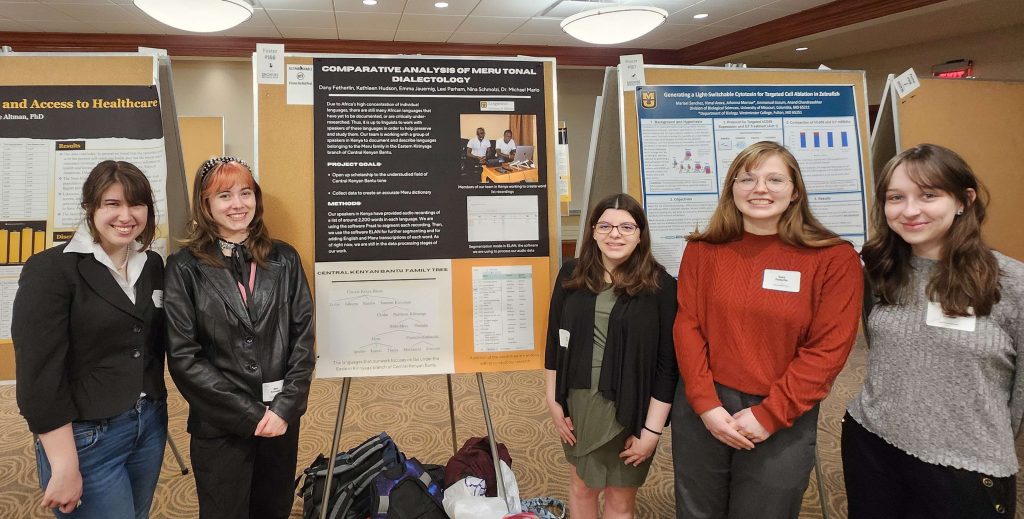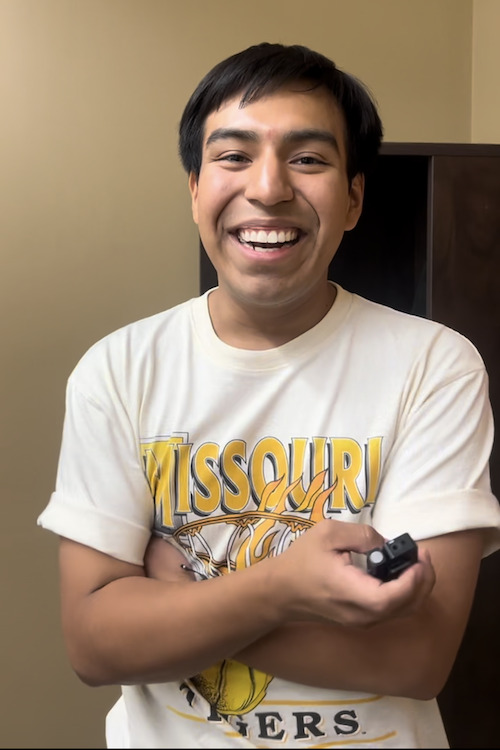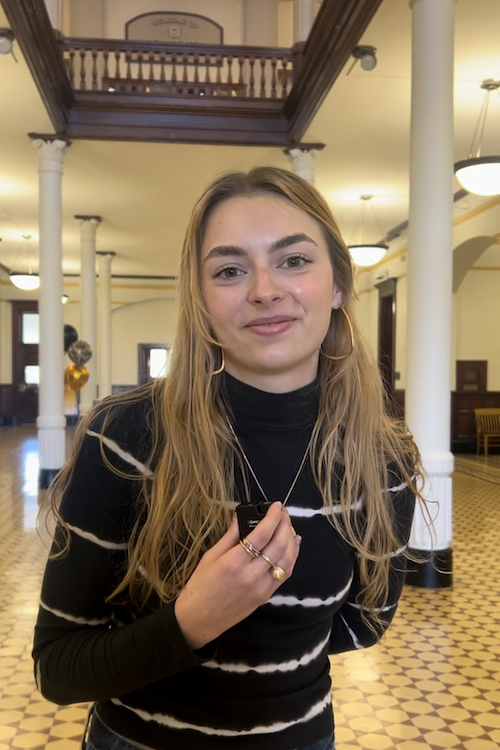Published on Nov. 6, 2024
Updated on Nov. 26, 2024
By Kaleigh Ibarra

Over 20% of Mizzou students are first-generation college students. In honor of First-Generation College Celebration Day, meet three Tigers who are writing their own stories.
Kathleen Hudson wasn’t worried about leaving home for college, but about connecting with other students on campus. Mizzou’s Office of First-Generation Initiatives encouraged her to make those connections and led her to other programs that opened doors for her.
Hailing from Oak Grove, Missouri, Hudson is a sophomore studying linguistics and international relations. She didn’t attend Welcome Week events her freshman year at Mizzou. But the First-Gen office hosted National First-Generation College Celebration Week events (as they have every November since 2021), and she attended as many as she could between her classes. In fact, Hudson won a Mizzou sweatshirt for attending more celebration week events than any other student.
It helped that their events were so interesting. There was free food, information about study abroad, a trivia night, and most importantly for Hudson, discussions about getting into research.
Hudson was already interested in research when she started college, but she didn’t know how it worked and had so many questions. The event she attended was aimed at first-generation students, which made her feel seen and more inspired to pursue undergraduate research.
She was introduced to the McNair Scholars Program, which prepares MU students who meet specific eligibility guidelines for doctoral study. As juniors and seniors, students can participate in research experiences.
Hudson applied and was accepted as a McNair Scholar, a paid opportunity where she could learn about research while being funded. It was a great starting point for her.
She works with her mentor Dr. Michael Marlo on a separate project related to his recent trip to Kenya. She’s transcribing and documenting an endangered language.
Connecting with mentors like Dr. Marlo inspired Hudson to apply to graduate school and work toward a PhD in linguistics. She’s considering incorporating research connected to international relations.
Along with the incredible academic opportunities that the First-Gen office presented, it also introduced Hudson to a community of students like her.
“It was really different for me and really nice to see people like me who are kind of as confused as me or kind of coming from the same place as me.” Hudson said.
She explained it’s a different level of connecting with someone, and you find so many common things to relate with each other about.
“[I didn’t realize] it was going to be a struggle to be a first-generation student because you kind of don’t know what you’re missing until you’re there in it,” Hudson said. “But it’s really nice to see other people who are kind of in the same position as you.”
She continues to seek guidance from the First-Gen office. Selena Meints, the First-Generation Initiatives Coordinator, wrote Hudson a letter of recommendation for her McNair application. Hudson now feels more comfortable asking for guidance and recognizes that help is always available.

Johnathan Martinez
Johnathan Martinez dreamed about leaving Missouri. He was worried if he didn’t, he wouldn’t discover other opportunities.
But a window opened when Mizzou extended him a generous scholarship that made college affordable. Along with other members of his scholarship cohort, Johnathan receives mentoring from the Center for Academic Success and Excellence (CASE). Now, Martinez is graduating debt free.
A senior majoring in history, agriculture and public policy with minors in engineering and sustainability as well as American constitutional democracy, Martinez plans to pursue a career in environmental law.
Raised near the industrial district of Kansas City, he witnessed a lot of environmental injustice growing up, and recognized early on how much it affected his community. He wants to advocate for a greener and safer future through law and policy. Martinez says that having the opportunity to further his education was and still is surreal, especially since he will be the first one in his family to write his own college story.
When Martinez entered college, it was a difficult start because he felt like there was so much going on. There were so many fees and financial considerations, and he didn’t know how to utilize many of the resources he was given. Even now, applying to graduate school isn’t any easier.
He received help from TRiO Student Support Services and CASE. But, along with many others on campus, he knew there was more to be done to support first-generation students.
With Selena Meints leading the effort and students like Martinez advocating for it, the Office of First-Generation Initiatives was established in 2023. The mission of the office is to support, celebrate and honor first-generation students and their families, as well as first-generation faculty, staff and alumni.
“When it comes to first-generation students, I think we should really pay attention and highlight the word ‘first,’” Martinez said. “And I think that should be a key word for us. Because we are the first to write the story, and so this is my story and I encourage all other first-gen students to write their own story, to write their own path.”
Martinez says he felt supported through his Mizzou journey by the community he surrounded himself with, who never made him feel any different than anybody else.
Martinez is president of the Interfraternity Council (IFC) at Mizzou this year.
“When I first came into my IFC role, this is such a precious community that very often do not see people like me involved, and so by stepping into this role I was able to utilize our community, our staff members, and everyone around and these people supported me, and I never felt like [I didn’t belong].” Martinez said. “I want future first-generation students to know Mizzou is a place of what you make it.”
Martinez received the 2024 First-Generation Involvement Award from the Center for Student Involvement. It’s awarded to a member of the graduating class who is the first in their family to earn a bachelor’s degree and has demonstrated a record of personal achievement, service and involvement in the university community.
Martinez has his fraternity, Phi Kappa Theta, to thank for especially helping him become more involved in the Mizzou community. This past October, he represented them in the Top 10 Homecoming Royalty court. Martinez explained what an honor it was to be recognized among a great group of peers, and what a privilege it was to live the Mizzou dream and share it on a stage.
Madi Arends
As Madi Arends writes her own story, she prepares for graduation and navigating graduate school.
Originally from Belleville, Illinois, which is half an hour from the state line, Arends didn’t know about schools besides Mizzou when graduating from high school. She did know she wanted to study psychology. Experiencing a family loss pushed her to focus on and advocate for mental health.
Being a first-generation college student, Arends didn’t really know what to do in academia. She initially thought counseling was the only path available. But when she came to school, she saw a broader range of careers offered. She felt overwhelmed by the variety of careers she was surrounded by. She didn’t know what research looked like, and at first, she didn’t realize that research wasn’t limited to those exclusively in S.T.E.M. fields.
She got involved in research starting her second semester of freshmen year when her professor, Dr. Timothy Trull, announced he was looking for research assistants. Her experience made her realize she wanted to explore the developmental path, and she started asking around for other opportunities while also meeting many professors.

Dr. Linda Blockus, director of the Office of Undergraduate Research, encouraged Arends to work with the Office of First-Generation Initiatives and explore all opportunities available through research.
Arends’ experiences inspired her to help others through their own.
“At the end of the day, it’s pushed me to really want to help other students who are first generation and help teach them things that I wish I knew coming into college.” Arends said.
For example, she would encourage students to apply for scholarships both before and during college.
“It was easy for me to think, ‘People like me aren’t the ones who are usually given these kinds of opportunities and awards; why would I even apply?’” Arends said.
She served on a panel put together by the Office of First-Generation Initiatives and Nurturing My Wellness Program. There, she spoke about her experience being a first-generation student, and doing so helped her understand what she’s been through. It was comforting hearing other people go through similar things. She explained how it brought people together in a way that wouldn’t have happened otherwise.
She hopes to serve on more panels for first-generation students in the future and help teach undergraduate students about what they should know going into school and how to navigate academic environments. She wants to inform students about research opportunities, and she’s determined to help build more first-generation resources in areas where they’re lacking.
While her Mizzou journey will be closing soon as she plans to graduate early in the spring of her junior year, her academic journey isn’t over yet. She’s focused on attending graduate school to continue her research and wants to be a professor one day.
If you asked Arends before why she wanted to go to Mizzou, she says she wouldn’t have been able to offer a reason. But now, there are so many reasons she chose to stay.